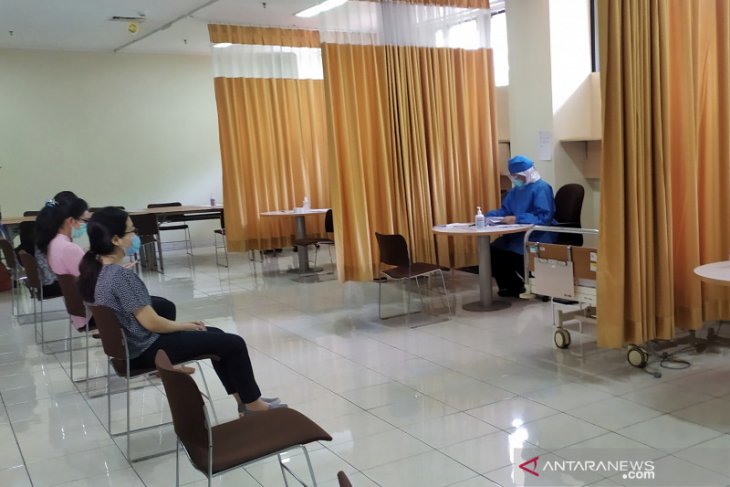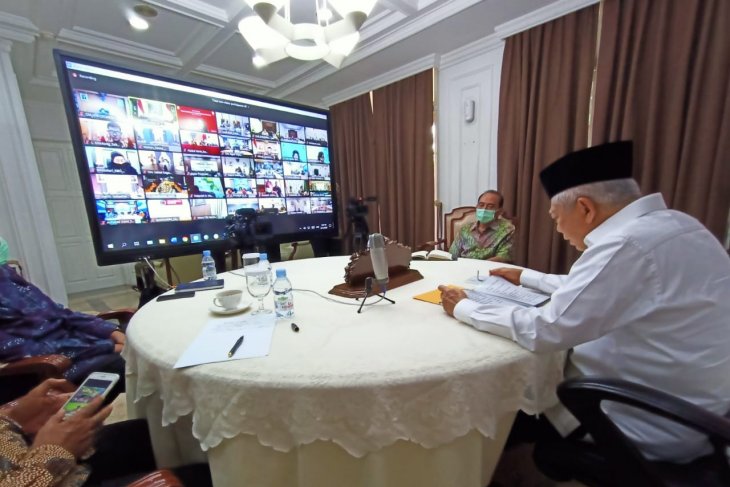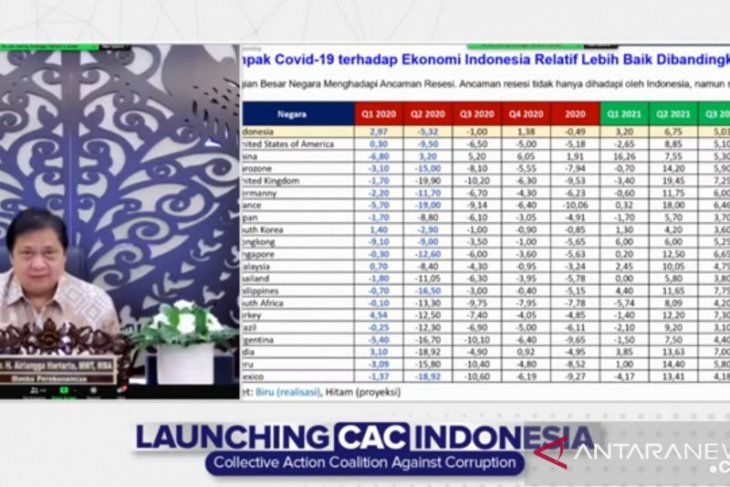Live Streaming
Program Highlight
Company Profile

Ani Hasanah
August

Coordinating Minister for Economic Affairs, Airlangga Hartarto, during the launch of the 5th National Fruit Event in Jakarta on Monday (August 10, 2020). (ANTARA/HO-Kemenko Perekonomian/pri)
Despite contracting 5.32 percent year-on-year (yoy) in the second quarter of 2020, the Indonesian economy is still in a better condition compared to several other countries, Coordinating Minister for Economic Affairs, Airlangga Hartarto, said.
“The Indonesian economy last contracted 5.32 percent (in Q2 2020). The contraction also affected other countries. But, Indonesia is still relatively better than other countries that fell deeper (into economic decline),” he said during a discussion in Jakarta on Tuesday.
He said some other countries have suffered a deeper contraction, with the British economy shrinking by up to 19.9 percent, the Hong Kong economy contracting 12 percent, the Singapore economy falling 12.6 percent, and the Indian economy slumping 18 percent.
The third quarter of 2020 offered a significant momentum for the Indonesian economy to rebound, he said.
To that end, the realization of government spending must be able to support the national economy in the third and fourth quarters so that it grows as targeted this year, he remarked.
“We must see the third quarter as an important moment so government spending can support economic growth in the third and fourth quarters,” he said.
In addition, the government must also encourage household consumption, which contracted up to 5.51 percent in the second quarter, and so that it contributes significantly to the national economy, he said.
“As we know household consumption is the main contributor of the Indonesian economic growth. Therefore, market confidence and a safe market are the main priority during this period of time,” he explained.
He noted that several sectors still grew positively in the second quarter in spite of the COVID-19 pandemic. They were the agricultural sector, which grew 2.19 percent; information and communication sector, which expanded 10.88 percent; and, the financial services sector, which grew 1.03 percent.
Several sectors also have shown signs of improvement since June, 2020, including consumer confidence index which rose to 83.8 points in June from 77 a month earlier. (ANTARA)
August

The Sinovac COVID-19 vaccine clinical trial research at Bandung’s Padjajaran University Hospital, West Java. ANTARA/Bagus Ahmad Rizaldi/ac.
PT Bio Farma Director Honesti Basyir has made assurance that Indonesians will be prioritized during the distribution of the COVID-19 vaccine after passing the clinical trial period and securing permission for production.
"The priority is for domestic (use) first," Basyir stated at the Padjajaran Institute Hospital in Bandung, West Java, on Tuesday.
As per calculations, 160 million Indonesians will be prioritized to receive the vaccine that originated from China's Sinovac.
The Bio Farma director noted that each individual will have to be administered two doses of the vaccination.
"Next year, the target is set to vaccinate 160 million members of the population, with each individual receiving two doses, thereby translating to the fact that we will require to prepare 320 million doses," he stated.
Basyir noted that once the vaccination requirements for Indonesians were met, Bio Farma will then consider exporting the vaccine to other countries.
Currently, the company is awaiting the conclusion of the clinical trial process as well as the licensing phase from the Food and Drug Supervisory Agency (BPOM) that is targeted for completion in January 2021.
Furthermore, Basyir stated that Bio Farma had an annual production capacity of 100 million vaccines. By December 2020, the company will have a new building, thereby leading to another 150 million doses being added to their annual production.
"The president is looking at a new building that can result in the added production of 150 million doses per year. It will be completed in December. Thus, in terms of capacity, we will be ready (to produce) 250 million doses in December," he expounded.
In the meantime, President Joko Widodo was optimistic that the vaccine, still under the clinical trial phase, would be able to tackle the COVID-19 pandemic in Indonesia while prioritizing its citizens.
"We are optimistic that with the finding of the vaccine, we would be able to distribute vaccines to all Indonesians," he added. (ANTARA)
August

Vice President Ma'ruf Amin opens an online coordination meeting on the simplification of the bureaucracy in Jakarta on Tuesday (August 11, 2020). (ANTARA/HO-Asdep Komunikasi dan Informasi Publik (KIP) Setwapres)
A presidential regulation has been drafted for the second round of the dissolution of state institutes, including working teams, boards, and committees, at the end of August, 2020, said Administrative and Bureaucratic Reform Minister, Tjahjo Kumolo.
“Right now the Ministry of Administrative and Bureaucratic Reform, the State Personnel Board (BKN), the Finance Ministry, and the State Secretariat have prepared a draft presidential regulation on the second round of the dissolution (of state institutes),” he said, while opening a virtual coordination meeting on bureaucratic simplification along with Vice President Ma'ruf Amin in Jakarta on Tuesday.
The second round of the dissolution of 11-13 state institutes is a follow-up to the disbanding of 18 institutes by President Joko Widodo through Presidential Regulation No. 82/2020 on the Committee for the Handling of COVID-19 and National Economic Recovery.
“In syaa Allah (God willing), 12 to 13 more institutes will be dissolved at the end of August, 2020,” he said.
The disbanding of state institutes, which were set up based on presidential decrees and laws, is part of efforts to streamline the bureaucracy since their tasks overlapped those of ministries and non-ministerial government institutions, he elaborated.
He said it takes a long time to dissolve state institutes that are set up based on law because disbanding them requires a seal of approval from the House of Representatives (DPR).
“We also recommend the dissolution or integration of boards or institutes set up based on law. It takes time and (due) process because they must be discussed with DPR,” he explained.
Meanwhile, Vice President Ma'ruf Amin said the simplification of state institutes will make the bureaucracy more effective, efficient, and proactive in solving a wide range of issues.
“Bureaucracy must be able to produce decisions quickly and accurately. Bureaucracy can move dynamically if it has a proportional structure, in accordance with the needs,” he noted. (ANTARA)
August

Indonesian Coordinating Minister for Economic Affairs, Airlangga Hartarto, has predicted the Indonesian economy will contract 0.49 percent this year as a result of the COVID-19 pandemic.
“Hopefully, it (the economy) will improve in the third quarter. It is predicted to grow minus two or minus one percent. But, we hope it will grow positively,” he said while launching the coalition of joint action against corruption (CAC) at an online event in Jakarta on Tuesday.
The Indonesian economy is expected to contract 1 percent in the third quarter of 2020 and to grow 1.38 percent in the fourth quarter of this year, he said adding, overall, the economy is expected to contract 0.49 percent this year.
He said the impact of the COVID-19 pandemic on the Indonesian economy has been relatively less severe than other countries.
The Central Statistics Agency (BPS) had announced earlier that the Indonesian economy contracted 5.32 percent in the second quarter of 2020 from 2.97 percent in the previous quarter.
Several other countries also saw their economies fall deeper into a decline in the second quarter.
Hartarto said the US economy contracted 9.5 percent, the British economy 19.9 percent, and the French economy 19 percent in the second quarter. In fact, the last two countries suffered a recession, he remarked. (ANTARA)

